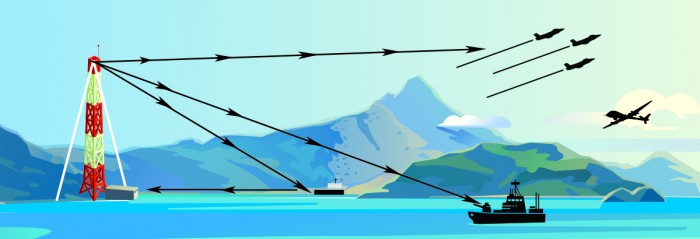(Source: Reuters via Ken Hansen and Dan Hawkins)
LONDON (Reuters) – The risk of cyber attacks targeting ships’ satellite navigation is pushing nations to delve back through history and develop back-up systems with roots in World War Two radio technology.
Ships use GPS (Global Positioning System) and other similar devices that rely on sending and receiving satellite signals, which many experts say are vulnerable to jamming by hackers.
About 90 percent of world trade is transported by sea and the stakes are high in increasingly crowded shipping lanes. Unlike aircraft, ships lack a back-up navigation system and if their GPS ceases to function, they risk running aground or colliding with other vessels.
South Korea is developing an alternative system using an earth-based navigation technology known as eLoran, while the United States is planning to follow suit. Britain and Russia have also explored adopting versions of the technology, which works on radio signals.


“…Britain and Russia have also explored adopting versions of the technology, which works on radio signals. ” Well strictly speaking, all these systems – including GPS etc – use radio signals.
I thought long wave Loran was phased out because of the QRM cesspool down there making it useless but the internet is worse with a cesspool of cyber viruses. Maybe the internet should be phased out for all safety and mission critical uses.
Mother Nature and terrorism are valid reasons to have old-school technology as a backup just in case. Radio comms, where the only thing between you and the other op are the ethers are much less complicated and not as vulnerable as Internet-dependent and high-tech proprietary technologies. Hopefully some of the maritime radio beacons of yesteryear will be recommissioned.
Thanks for sharing this bit of encouraging news. Between this and the military’s movement back toward HF as a viable means of communication, perhaps we will stop being so dependent on the satellite model and re-learn to trust radio-to-radio communications.
Agreed, Robert. I’m all about using the most advanced and accurate systems for transport networks like this. Still, because of the potential grave consequences when those systems fail, we need a secure alternative. HF to the rescue!
The UK and Ireland are already since 2012 using a back up for Sat GPS called DGPS and is operated by Trinity House. It is centred around the 300kHz frequency band. It is maintained by Babcock International with first line maintenance by TH themselves.
Dave G4OYX
Thanks for the info, Dave!
Unfortunately, DGPS is basically a correction signal for GPS, & isn’t a “back up” per se. It works by having GPS receivers at fixed locations compare the difference between their physically-known location and the GPS derived location, and transmitting that difference as correction data (usually on the LF band – my local one is ~250kHz) to mobile receivers in the area.
If the GPS signal is “jammed” or otherwise interfered with, the correction data will be wrong or useless…